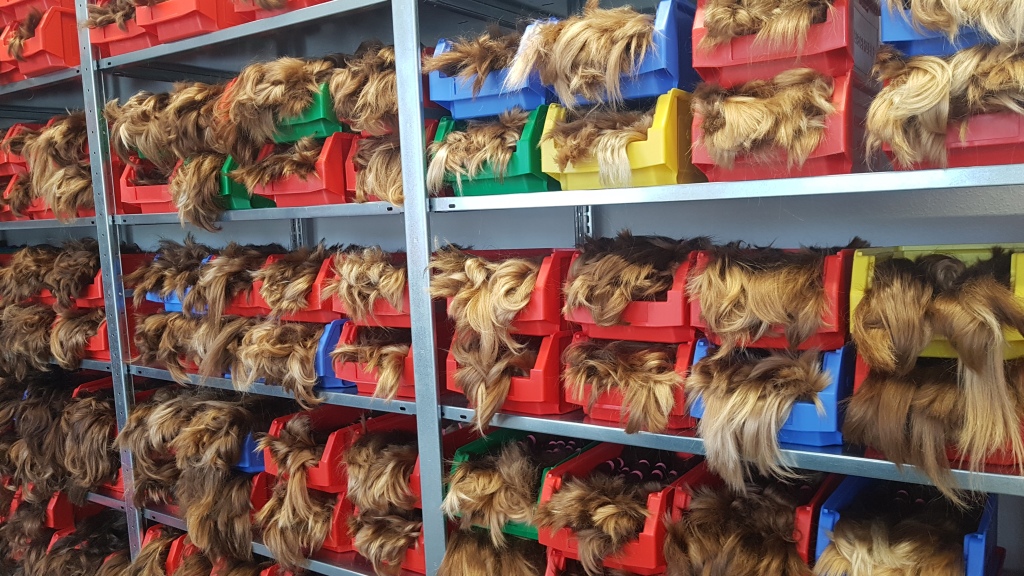When seventeen days are counted, a man will wake up in the morning of the eighteenth day and his hair, long or short, grey or blond, curly or smooth, will line his head on the pillow. If ever he lifts his head, they won’t follow the movement. Wind might blow them away, as they have no roots. Where once was the human head, there will be an empty space on the pillow.
The man knew it would happen. The doctors had told him. Chemotherapy prevents cell division. When cancer cells are attacked, hair loss is one of the visible collateral damages. When seventeen days are counted, hair falls out.
A building is by no means enough to salvage the hair the wigs the manufacturer in Amsdorf* will use on day 18 to simulate life on a human being’s head, trying to him them preserve his self-image, save his beauty, confront death, and in doing so, offer him not to make head against death but a bald head.

Hair reaching up to the hips for teenagers who suffer from leukemia and don’t know their lovers yet, white hair, elegant and well styled, for the one who was looking forward to a carefree retirement – hairpiece after hairpiece awaits its destiny for a second life. Father and sons continue to collect restlessly, adding shades to the hair palette. The donations, which are delivered daily, fill big baskets. Hairdressers hand over cut braids. The hair recently purchased in Peru is stored in a separate room – carefully ventilated to regulate its moisture. Peruvian hair is valuable – it does not contain any chemicals, because people in the South American country have no money to dye hair. The cut off braid probably serves for pure survival. One of them is grey.
Amsdorf celebrates its 700 years. Historical sites everywhere – the baker refers to the year 1842. Only the sunshade’s imprint ‘Meat Market’ does not keep its promise: liverwurst and ham have given way to an executive consulting. Beautiful, fat life gives way to Weightwatcher mentality. In the cool church room, a small group of older women and gentlemen read to each other from the Pentecost Novena.
The wig maker family has been working with human hair for centuries. Their gallery of ancestors decorates the walls and bears witness; the family’s chronicle from scissors to wigmaker is on the company’s website.

Over five generations, the former barbers have become specialists in hair replacement. Nevertheless, the premises of the manufactory are equipped with all the insignia of a hairdressing salon: people blow-dry hair, turn it on curlers, wave it with steam, and cut it into shape. However, there is no buzzing of chatter and gossip. The plastic busts are silent under the hood dryer. Conversations with clients take place in bright rooms. People are offered protection. Once they leave those rooms, their second hair can be seen in daylight on terraces and balconies. In a showroom, scarves and hats, caps and turbans are presented. Woven headgear is reminiscent of summer holidays on spectacular beaches of the imagination. However, sun cream SPF 30 cannot be found.
Revelation hides from the public eye. Sorted according to color nuances, arranged according to length, carefully draped or layered in boxes, the treasure of the manufactory is stored in a warehouse. An archive of hair, a library of identities, distributed among several houses, in rooms connected by a network of corridors.
A novena is a prayer spoken on nine consecutive days. June 4 was the fifth day and was dedicated to ‘Unity in Diversity’. I listen to the ladies and gentlemen in the church of Ramsdorf for a while. Slowly, the words they read form into sentences.
“One experiences intolerance, prejudice and isolation on a personal level. Populism, extremism, exclusion and even open hostility – all these are products of a misunderstood identity. People with such a sense of their own identity feel threatened by what is different, and seek security in forced homogeneity. God showed us at the first Feast of Pentecost how he approached diversity in the world: everyone was able to keep his own language and culture, yet all were united in the Holy Spirit. All could understand the apostles and form a community of faith – without man-made unity. Foreigners, those who think or believe differently, migrants – the outcasts of our society – today ask us the question: Are we ready to believe in the possibility of spiritual unity in diversity?“1
One can believe in this God or in another spiritual power, one can question philosophy. or – being an atheist – reject any confession of God. The text can be easily modified accordingly. Read in this way, his formulations seem more humane and radical to me than the current migration policy.
There are one hundred kilos of hair in my car, that do not meet the quality standards of the Amsdorf wigmakers or simply lack the necessary hair length. Assuming the average amount of hair donated is fifty grams, it would be the hair of two thousand people.
Legden is my last stop on this hairdresser day. I like to visit the Haartreff Lammert and meet the hair clippers from former Soviet republics, the Haarteam Legden, with its village clientele and the salon of Melanie Busert, whose thoughts fly beyond the exit sign of the village. It is late afternoon. The boss of the shop hurries in company of her little daughter and a young woman along the main street towards Volksbank. Kiki spends a year as an au pair in the village with 7000 souls. The young woman is from Zimbabwe.
The trio falls out of the picture arch of Westphalian villages and small towns, falls out of the scenery, of a world described by Gottfried Keller in the 19th century.
Everything stays calm. For the time being, unity still dominates diversity.
1 https://www.renovabis.de/material/material-fuer-den-gottesdienst/novene english pdf
* name of the village changed on request



